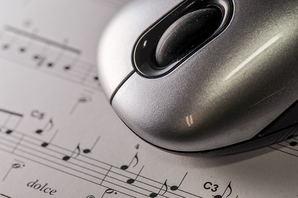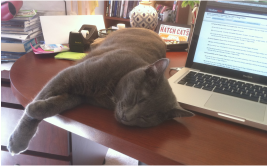 “Nobody writes alone in Nashville.” That might be a slight overstatement, but most musical compositions (or "songs") -- regardless of where written -- are the product of more than one songwriter. Unfortunately, even many career songwriters do not fully understand the legal implications of co-writing. When two or more writers (or “authors” in copyright parlance) intentionally join forces to create a new song (e.g., during a writing session) the scenario is pretty straightforward. 17 U.S.C. § 201(a) provides that the resulting musical composition is a joint work if, at the time of creation, the authors intend for their contributions to be merged into a single work. Absent a written agreement (e.g., a “split letter”) to the contrary, the authors own the composition collectively as tenants-in-common, with each owning an equal and undivided interest in the entire song. In short, an “undivided interest” means that no author owns exactly what he contributed, but as a joint work, each author owns an equal share of the entire song, unless otherwise agreed in writing. Each author (or the author’s assignee -- typically a music publisher) may enter into non-exclusive licenses regarding the entire composition, subject to the continuing obligation to account to the other owners for their share of revenue from the commercial exploitation (use) of the work. Labels should obtain a mechanical license from each owner if it is a first use of the composition; however, as a practical matter, most record labels will record the song, and once the copyright owner accepts royalties, it may constitute an implied license. Few people object to having a song cut and being paid. Determining if a song is a joint work can be trickier if it was created from contributions by authors at different times, instead of during a co-writing session. For instance, if a lyricist writes lyrics and a composer sets those lyrics to music, without the lyricist’s knowledge or intent to create a joint work, the result is not likely a joint work, but rather a derivative work, which raises copyright issues beyond the scope of this article. Most courts require that each author contribute at least enough creative expression to make the contribution protectable under copyright (i.e., not merely an idea or title), and where the contributions are made at different times, there must be an agreement in writing demonstrating the parties’ intent that the contributions were intended to be part of a joint work. Also, although each joint author must contribute some creative element to the final product, each author need not contribute the same amount. Most professional songwriters adhere to the standard practice of scheduling dedicated co-writing appointments, which limits potential ambiguity over copyright ownership. When ownership of a particular work is questionable because of time or geographic distance between the authors’ contributions, it is best to clarify each author’s intent early and in writing. It's also a good idea not to wait until a song is a hit to work out an agreement, as writers who were friends when writing may become quite disagreeable when money is at stake.
1 Comment
 After working with many talented songwriters over the years (and being a “songwriting hack” myself), I know that writers never know when or where a great song idea will materialize. To paraphrase one extremely talented writer I know, “Songs are just floating in the air and you have to grab them when you can.” Don’t count on remembering the next morning that perfect hook that comes to you in a dream. Take a tip from the Boy Scouts and “be prepared.” Commercially successful writers understand this concept very well. Back when I still had delusions of writing that one big “evergreen” song and retiring to an island, I kept digital voice recorders (I know, I'm old) in my car and briefcase so I could capture my song ideas in an instant. Today, savvy songwriters can take this concept several steps further by establishing a multi-step digital songwriting workflow. Apple iPhone or iPad users can capture the basic elements of a song “on the fly” in the iOS version of GarageBand and later transfer the project to GarageBand or Logic Pro X on a Mac for more detailed production and sweetening. I have heard some impressive demos (and even released singles) that were produced in GarageBand, but the real power of this workflow is the ability to move files from the capture device to a more robust DAW ("Digital Audio Workstation," for those following along at home). Exporting GarageBand iOS projects into Apple Logic Pro X is a very streamlined process. Moving complete projects to other DAWs (e.g., Pro Tools) might involve a few steps, but is a far superior alternative to being forced to recut every track in the studio. Of course, DAWs also are available on non-iOS devices. It is a good practice to check the export functionality on any smartphone based DAW before download. There are many resources available to take even the most technologically illiterate composer from "zero to demo" and beyond in no time. The point is, when that song comes into your head out of thin air, you need to get it down so you can remember that original inspiration. It might be enough to just jot on the back of your hand “that song about mountains,” but probably not. Having a way to record the nuances of your inspiration will make finishing your song much easier.  Welcome to The Levine Entertainment Law & Business Monitor. When I set out to create this blog, I asked myself a critical question -- "How many words can I fit in the name without losing readers' attention before they get to my first post?" After weeks of intense research, I settled on six. And after significant internal conflict over whether ampersands really count, I decided to add "the" to the beginning -- an addition that I'm sure you'll agree communicates authoritativeness and class, with just enough pomposity to remind you that it's a blog written by a lawyer. But seriously, my primary goal was to create a useful source for information about the legal and business aspects of entertainment, delivered in a casual, easily understandable, and frequently irreverent style. I hope you will subscribe and share your suggestions for topics. Thanks for visiting. P.S., My research also suggested that including cat photos on my website would boost its search engine rankings, so please enjoy this picture of my assistant, Buddy. What he lacks in motivation, he more than makes up for in loyalty. |
AuthorL. Kevin Levine is the founder of L. Kevin Levine, PLLC (go figure), a boutique entertainment, copyright, trademark, and business law firm in Nashville, Tennessee. A lifelong musician who grew up in his family's music store, it was inevitable that Kevin would build his legal career in entertainment and business. Archives
June 2016
Categories
All
|


 RSS Feed
RSS Feed